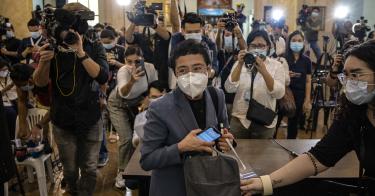On Monday, June 15, a court in Manila, Philippines, found Filipino-American journalist Maria Ressa and her fellow researcher-writer Reynaldo Santos Jr. guilty of “cyber libel.” The charges against the pair appear to be politically motivated.
Formerly a CNN bureau chief in Manila and Jakarta, Ressa is the editor and chief executive of Rappler, a Philippine publication known for its extensive—and overwhelmingly negative—coverage of President Rodrigo Duterte and his war on drugs.
In 2018, Time magazine honored her groundbreaking reporting by including her among a group of 100 journalists the publication recognized as persons of the year. At the time, she was the only reporter in the group who was not already dead or imprisoned, according to former Secretary of State Madeleine Albright who wrote Ressa’s feature for Time.
The government’s case against Ressa concerns a Rappler article she published, but did not write. Written by Santos in 2012, the article alleged ties between businessman Wilfredo Keng and then-Philippine Chief Justice Renato Corona. The article also alleged that Keng was involved in human trafficking and drug trafficking, among other illegal activities.
Santos’s article was published four months before the new cyber law came into effect in September 2012. To reach a guilty conclusion, the court had to apply the law retroactively.
Ressa’s lawyers objected to that. They also contended that the case should have been thrown out because Keng did not press charges until after the statute of limitations had expired. Opposing counsel appear to have overcome both objections by contending that a minor spelling correction made to the article in 2014 constituted a republication of the piece, thereby giving them an opportunity to press charges within the statute of limitations. Now Ressa and Santos face between six months and a day to up to six years in prison.
The cyber libel law itself has been widely criticized since its inception. The Cybercrime Prevention Law of 2012 was set up primarily to deal with crimes like cybersex, pornography, and hacking. But its new regulations on cyber libel were roundly criticized as having the potential to chill free speech and freedom of expression, both of which are guaranteed under the Philippines constitution. The new law widened the aperture of types of speech that might be considered libel, including things said by private individuals on social media.
Since the law’s passage, the Philippines has continued to rank poorly in the annual Reporters Without Borders press freedom index. It has ranked as low as 149th (out of 180 countries) in 2014 and 134th in 2019.
Many fear for the long-term state of freedom in the Philippines. Duterte has ruled the Philippines with an iron fist. Amnesty International has condemned his war on drugs as spurious. Meanwhile, Duterte has cracked down on media outlets other than Rappler, most notably broadcasting network ABC-CBN, which was for all intents and purposes shut down last month.
The conviction of Ressa and Santos casts a darker shadow on press freedom in the Philippines. The U.S. should strongly condemn this as a part of its “free and open Indo-Pacific” strategy, which emphasizes the importance of promoting and defending freedom in the region. It should also consider whether there is anything it can do to defend Ressa, who herself is a dual citizen.
As Ressa noted in a post-trial BBC interview: "Rappler and I were not the only ones on trial… I think what you're seeing is death by a thousand cuts - not just of press freedom but of democracy."
This piece originally appeared in Forbes https://www.forbes.com/sites/oliviaenos/2020/06/16/what-maria-ressas-conviction-means-for-press-freedom-in-the-philippines/#4e4641563db2



